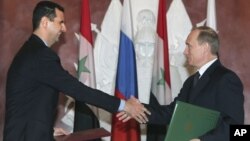MOSCOW - Russia is Syria's biggest ally. Over the last year, the Kremlin has painted the Syrian revolt as a proxy war between East and West. Now with Syria slipping more and more into a civil war, can Moscow use its influence over Damascus to forge a political solution?
Syria’s ambassador to Russia told reporters in Moscow Thursday that “armed terrorist groups” are committing massacres in order “to excuse foreign intervention, foreign interference and buffer zones.”
Ambassador Riyad Haddad said that 1,500 Syrian soldiers have been killed in the two months since the cease-fire announced under the Kofi Annan peace plan for Syria.
On Monday, Hervé Ladsous, the head of U.N. peacekeeping operations, said Syria is now in a civil war.
But blaming the escalating violence on Western-backed terrorists is music to many ears in Moscow, a close ally of Syria’s ruling Assad family for the last 40 years. Long the largest source of arms for Syria, Russia maintains its only naval base outside the former Soviet Union at the Syrian port of Tartus.
In Moscow, Russian analysts casually dismiss reports of government massacres of Syrian civilians as part of a “Western media war.”
This view is shared by Yevgeny Satanovsky, president of the Institute of Near Eastern Studies. He has his own solution to Syria.
“The only way is the same that was during the Vietnam War - Yankee Go Home. In this time, we can say, Europeans, Americans, Gulf monarchies and all other idiots trying to play a game in Syria, including Turkey, can take their luggage, go home, and sleep well," he said.
“The only way is the same that was during the Vietnam War - Yankee Go Home. In this time, we can say, Europeans, Americans, Gulf monarchies and all other idiots trying to play a game in Syria, including Turkey, can take their luggage, go home, and sleep well," he said.
Asked about Russia, he said Moscow has no involvement in Syria’s internal conflict.
This week, U.S. Secretary of State Hillary Clinton charged that Russia is shipping attack helicopters to Syria. This shipment would come after at least three Russian ships delivered arms to Syria in recent months.
Next week, Syria is likely to be discussed when Barack Obama and Vladimir Putin have their first presidential-level meeting. The meeting may well be tense. Mr. Putin is never known to have used in public the word "reset", a code word for the détente policy favored by his predecessor, Dmitry Medvedev.
Carnegie Moscow Center’s Masha Lipman predicts that progress on Syria will fall victim to Mr. Putin’s desire to block Washington at every turn.
“The distrust, the suspicion that America is a threat, that America is there to weaken Russia remains the basis of their relations, and given the inauspicious environment these days, inside Russia, outside Russia, I think the contradictions come to the fore," she said.
“The distrust, the suspicion that America is a threat, that America is there to weaken Russia remains the basis of their relations, and given the inauspicious environment these days, inside Russia, outside Russia, I think the contradictions come to the fore," she said.
With the Annan peace plan due for renewal by the United Nations in one month, many analysts say the clock is running out before Syria descends into the kind of sectarian civil war seen in neighboring Lebanon in the 1980s.
In the 15 months since the fighting broke out in Syria, the opposition calculates that 13,000 people have been killed.
In Moscow, Fyodor Lukyanov, editor of the journal Russia in Global Affairs, writes that Russia and Iran must act now “to prevent [an] avalanche that would bury their interests in Syria.”
He writes that the solution is for the two nations to push for a gradual change of power from the Assad family.
Despite the anti-Western fireworks often heard in Russia on Syria, Moscow may be coming around to that view.
On Wednesday, Russian Foreign Minister Sergei Lavrov gave a press conference in Tehran with his Iranian counterpart, Ali Akbar Salehi. Lavrov stressed that Russia’s ties and interests are with the Syrian people, not with the Assad clan.
Now, it remains to be seen if Moscow can move fast enough to broker a political solution, before Syria descends into a full-fledged civil war.




